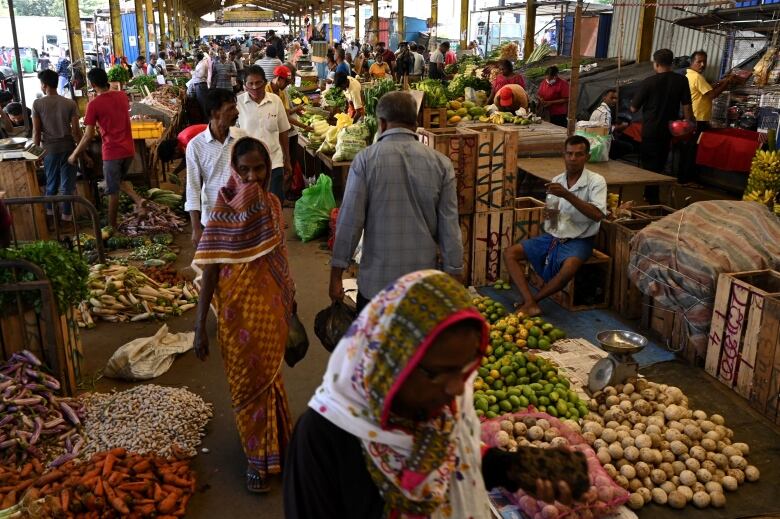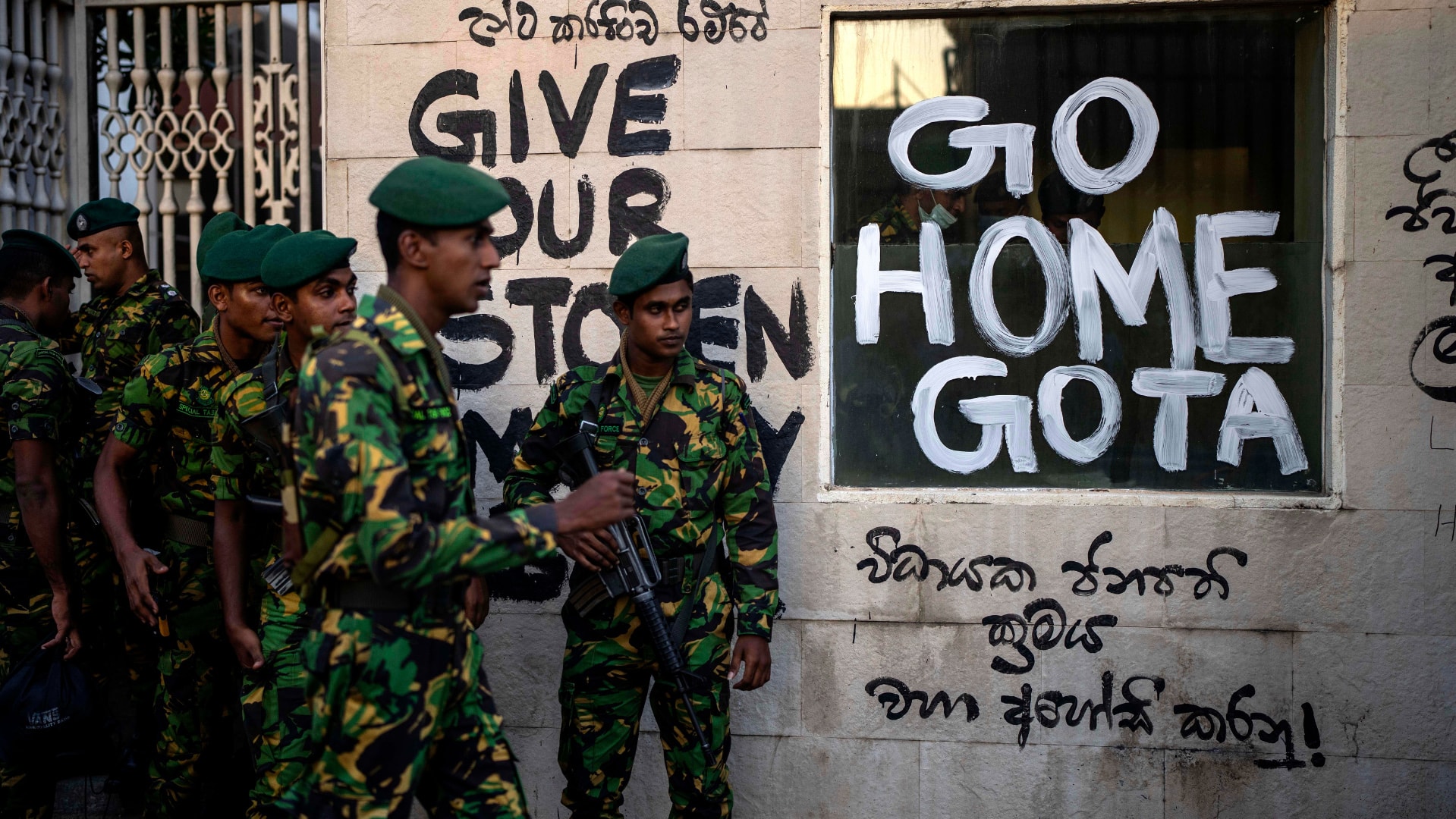Economy
Sri Lanka's political, economic turmoil leaves millions facing a food crisis – CBC News
Aid agencies are warning the health and well-being of six million Sri Lankans could be in peril as the country contends with extraordinary political upheaval and a punishing economic collapse.
Ousted president Gotabaya Rajapaksa fled the country Wednesday, the day he was set to resign under intense public pressure to step down because of his handling of the country’s finances.
Several factors have caused Sri Lanka’s foreign currency reserves to dry up, leaving the government unable to pay for vital imports of food, cooking gas, fuel and medicine — all of which are in short supply.
Observers are warning that if the situation doesn’t improve soon, one-third of the country’s almost 22 million people could plunge further into food insecurity as the country endures its worst financial crisis since gaining independence in 1948.
The World Food Programme (WFP) warned some 62,000 Sri Lankans are in such a dire situation they require urgent help.
Food insecurity is defined by the United Nations as the “lack [of] regular access to enough safe and nutritious food for normal growth and development and an active and healthy life.” Severe insecurity means a person has “run out of food” and may go a day or more with nothing to eat.
Sri Lankan President Gotabaya Rajapaksa has fled the country as protesters stormed the prime minister’s residency demanding his resignation due to an economic crisis. Prime Minister Ranil Wickremesinghe has been named interim president, further angering Sri Lankans amid shortages of food, fuel and power.
Hunger in Sri Lanka by the numbers
Food inflation rose 80 per cent in June, compared to a year earlier, according to Sri Lanka’s Central Bank, while the economy tumbled and food and fuel supplies continued to dwindle.
The UN said more than 60 per cent of Sri Lankans were already choosing to limit meals to stretch their food budgets. In one dire example of the lengths some vulnerable people need to go in order to eat, Britain’s Sky News reported some families travel nearly 10 kilometres on foot to get free meal from a community kitchen in Colombo.
In an appeal to donors, the charity Save the Children estimated last week 12 per cent of the country’s poorest households are taking “crisis level” steps to survive the food shortages and economic collapse. These measures include borrowing money, taking children out of school or selling belongings, the organization said, citing its own survey of more than 2,300 families.
There’s an acute concern for pregnant or breastfeeding women, and children, according to the WFP. The agency said a national school meal program that “provides nutritious meals to one-in-four schoolchildren” has faced disruptions, and a nutritional support program for nursing mothers and young children “has been cut.”
“Coupled with income losses, this could lead to higher rates of malnutrition among women and their children,” WFP said.


Domestic food production drops
Domestic food production also took a hit by the Rajapaksa government’s April 2021 decision to ban the importation of chemical fertilizers and agrichemicals, including herbicides and pesticides, in an apparent shift to organic agriculture. But the move was abrupt, with no plan to import organic fertilizers and no boost in domestic production.
By the time the ban was partially reversed in November, farmers reported a 40 to 50 per cent loss in rice paddy crops, the UN’s Resident Coordinator in Sri Lanka, Hanaa Singer-Hamdy, told the Daily Mirror last month. Fruit, vegetable and tea crops also suffered.
“Low-income households are the hardest hit and [are] adopting negative coping strategies,” she said.
The cost of chemical fertilizer has also risen dramatically since that time, amid a global shortage, leaving farmers in the lurch.
Impact of war in Ukraine
Russia has been accused of weaponizing food exports in its war on Ukraine to middle and lower income countries, and Sri Lanka appears to be one of the casualties.
Ukraine is a principal exporter of grain to lower income countries; it’s the fifth largest source of food products imported to Sri Lanka, according to the World Bank.
The Observatory of Economic Complexity, an open-source data visualization website, shows grains accounted for more than one-third of Sri Lanka’s total imports from Ukraine; other imports included vegetables, legumes, cooking oils and various spice seeds.


Ukrainian President Volodomyr Zelensky placed blame for the crisis in Sri Lanka on Russia, in a video address to the Asian Leadership Conference in Seoul, saying it should serve as a warning about the global implications of Russia’s invasion and blockade of Ukrainian grain and food shipments.
“The shocking rise in food and fuel prices caused a social explosion. No one knows now how it will end. However, you all know that the same outbursts are possible in other countries affected by food and energy crises,” Zelensky told the conference.
Is there any relief in sight?
Prime Minister Ranil Wickremesinghe, appointed acting president by Rajapaksa before he fled, informed parliament of the government’s intention to host an international donor conference that will include major Asian donors like India, China and Japan. According to the Economic Times, that won’t happen until Sri Lanka can reach a bailout agreement with the International Monetary Fund, though the Central Bank’s governor cautioned the current political instability may delay talks further.
Sri Lanka’s parliament is poised to elect a new president on July 20.
Last month, the United Nations made an appeal for $47 million US in humanitarian aid funding, to assist 1.7 million Sri Lankans in need until September.
in a statement to CBC News last week, Global Affairs Canada said the federal government provided an initial $50,000 in humanitarian assistance in May through the International Federation of Red Cross and Red Crescent Societies.
On The Coast8:28Sri Lankan immigrant puts unrest in context
Raj Retnanandan, a Calgarian who immigrated from Sri Lanka in 1981, weighs in on the economic and political unrest in Sri Lanka, and suggests a path to stability, prosperity and trust in his former country.
Economy
China Wants Everyone to Trade In Their Old Cars, Fridges to Help Save Its Economy – Bloomberg


China’s world-beating electric vehicle industry, at the heart of growing trade tensions with the US and Europe, is set to receive a big boost from the government’s latest effort to accelerate growth.
That’s one takeaway from what Beijing has revealed about its plan for incentives that will encourage Chinese businesses and households to adopt cleaner technologies. It’s widely expected to be one of this year’s main stimulus programs, though question-marks remain — including how much the government will spend.
Economy
German Business Outlook Hits One-Year High as Economy Heals – BNN Bloomberg


(Bloomberg) — German business sentiment improved to its highest level in a year — reinforcing recent signs that Europe’s largest economy is exiting two years of struggles.
An expectations gauge by the Ifo institute rose to 89.9. in April from a revised 87.7 the previous month. That exceeds the 88.9 median forecast in a Bloomberg survey. A measure of current conditions also advanced.
“Sentiment has improved at companies in Germany,” Ifo President Clemens Fuest said. “Companies were more satisfied with their current business. Their expectations also brightened. The economy is stabilizing, especially thanks to service providers.”
A stronger global economy and the prospect of looser monetary policy in the euro zone are helping drag Germany out of the malaise that set in following Russia’s attack on Ukraine. European Central Bank President Christine Lagarde said last week that the country may have “turned the corner,” while Chancellor Olaf Scholz has also expressed optimism, citing record employment and retreating inflation.
There’s been a particular shift in the data in recent weeks, with the Bundesbank now estimating that output rose in the first quarter, having only a month ago foreseen a contraction that would have ushered in a first recession since the pandemic.
Even so, the start of the year “didn’t go great,” according to Fuest.
“What we’re seeing at the moment confirms the forecasts, which are saying that growth will be weak in Germany, but at least it won’t be negative,” he told Bloomberg Television. “So this is the stabilization we expected. It’s not a complete recovery. But at least it’s a start.”
Monthly purchasing managers’ surveys for April brought more cheer this week as Germany returned to expansion for the first time since June 2023. Weak spots remain, however — notably in industry, which is still mired in a slump that’s being offset by a surge in services activity.
“We see an improving worldwide economy,” Fuest said. “But this doesn’t seem to reach German manufacturing, which is puzzling in a way.”
Germany, which was the only Group of Seven economy to shrink last year and has been weighing on the wider region, helped private-sector output in the 20-nation euro area strengthen this month, S&P Global said.
–With assistance from Joel Rinneby, Kristian Siedenburg and Francine Lacqua.
(Updates with more comments from Fuest starting in sixth paragraph.)
©2024 Bloomberg L.P.
Economy
Parallel economy: How Russia is defying the West’s boycott
|
|


When Moscow resident Zoya, 62, was planning a trip to Italy to visit her daughter last August, she saw the perfect opportunity to buy the Apple Watch she had long dreamed of owning.
Officially, Apple does not sell its products in Russia.
The California-based tech giant was one of the first companies to announce it would exit the country in response to Russian President Vladimir Putin’s full-scale invasion of Ukraine on February 24, 2022.
But the week before her trip, Zoya made a surprise discovery while browsing Yandex.Market, one of several Russian answers to Amazon, where she regularly shops.
Not only was the Apple Watch available for sale on the website, it was cheaper than in Italy.
Zoya bought the watch without a moment’s delay.
The serial code on the watch that was delivered to her home confirmed that it was manufactured by Apple in 2022 and intended for sale in the United States.
“In the store, they explained to me that these are genuine Apple products entering Russia through parallel imports,” Zoya, who asked to be only referred to by her first name, told Al Jazeera.
“I thought it was much easier to buy online than searching for a store in an unfamiliar country.”
Nearly 1,400 companies, including many of the most internationally recognisable brands, have since February 2022 announced that they would cease or dial back their operations in Russia in protest of Moscow’s military aggression against Ukraine.
But two years after the invasion, many of these companies’ products are still widely sold in Russia, in many cases in violation of Western-led sanctions, a months-long investigation by Al Jazeera has found.
Aided by the Russian government’s legalisation of parallel imports, Russian businesses have established a network of alternative supply chains to import restricted goods through third countries.
The companies that make the products have been either unwilling or unable to clamp down on these unofficial distribution networks.





-



 Health8 hours ago
Health8 hours agoRemnants of bird flu virus found in pasteurized milk, FDA says
-
Art13 hours ago
Mayor's youth advisory council seeks submissions for art gala – SooToday
-



 Science21 hours ago
Science21 hours ago"Hi, It's Me": NASA's Voyager 1 Phones Home From 15 Billion Miles Away – NDTV
-
News20 hours ago
Some Canadians will be digging out of 25+ cm of snow by Friday – The Weather Network
-



 Health12 hours ago
Health12 hours agoBird flu virus found in grocery milk as officials say supply still safe
-
Media19 hours ago
Jon Stewart Slams the Media for Coverage of Trump Trial – The New York Times
-



 Investment12 hours ago
Investment12 hours agoTaxes should not wag the tail of the investment dog, but that’s what Trudeau wants
-



 Sports23 hours ago
Sports23 hours agoAuston Matthews turns it up with three-point night as Maple Leafs slay Bruins in Game 2 – Toronto Sun




